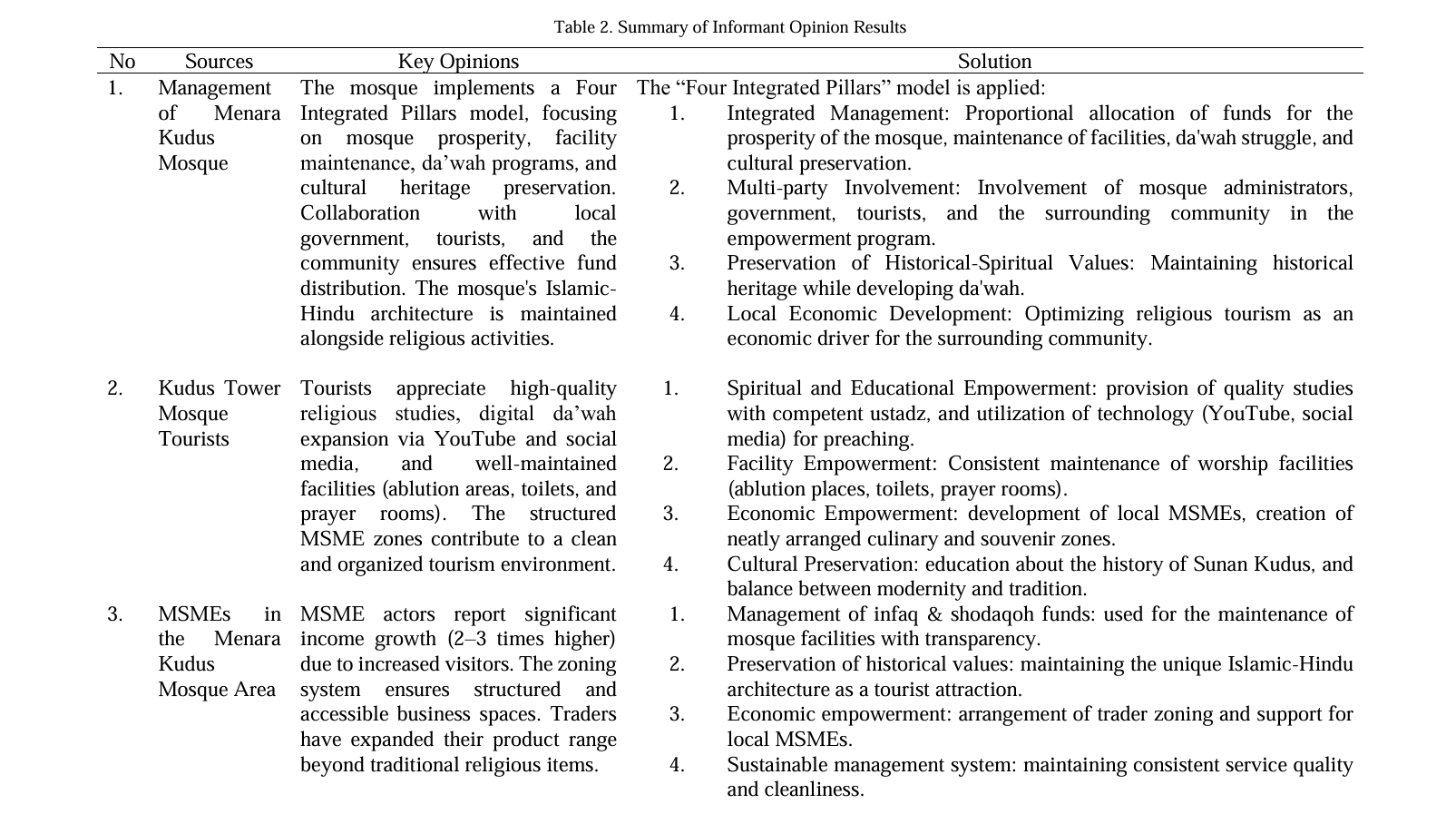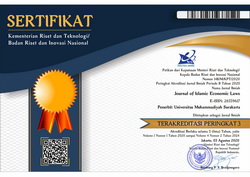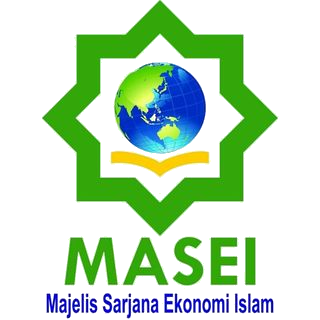Effectiveness of Infaq and Shodaqoh Empowerment in Religious Tourism Areas: A Study on the Menara Kudus Mosque
DOI:
https://doi.org/10.23917/jisel.v8i01.7371Keywords:
Religious Tourism, Empowerment, Infaq, Shodaqoh, Menara Kudus MosqueAbstract
Menara Kudus Mosque in Central Java was established by Sunan Kudus in 1549 AD (956 H). The site merges Hindu and Islamic cultural influences and attracts a growing number of worshippers and tourists, resulting in higher infaq and shodaqoh contributions that require effective management to benefit the surrounding community. This study examines the effectiveness of infaq and shodaqoh fund empowerment at the Menara Kudus Mosque using a qualitative approach based on interviews with mosque administrators, local residents, tourists, and MSME actors. The findings show that fund allocation focuses on four major areas: mosque prosperity, facility maintenance, da’wah programs, and cultural heritage preservation. Interview data also indicate stronger religious engagement, expanded economic opportunities for local MSMEs, and improved visitor experiences. The synergy among the community, mosque administrators, and tourists creates an environment that integrates worship, heritage conservation, and economic empowerment. These results highlight the strategic role of infaq and shodaqoh in fostering social, economic, and cultural development within a religious tourism setting.
Downloads
References
Abdullahi, Y. M., Abdulwahab, L., and Sani, M. A. (2023). Significance Of “Infaq” Funds On Youth Economic Empowerment. Journal Of Arts, Management And Social Sciences, 3(2), 484–492.
Abdussamad, Z. (2021). Metode Penelitian Kualitatif. Cv. Syakir Media Press.
Adibah, N., Rahmah, M. S., and Zaenal, M. H. (2024). Impact Of Human Development And Information And Communication Technology Development Indexes On Digital Zakat: Evidence From Indonesia. International Journal Of Zakat, 9, 86–97.
Akhmad, N. (2019). Cultural Diversity. Alprin.
Alifia, R. (2023). Fund Collection And Management Management Zakat (Foundation Fund Social Al Falah Surabaya). Proceeding Book Of The 5th International Conference On Business And Banking Innovation, 1–15.
Amalin, R. L., Sa, R., and Maftukhatusolikhah. (2023). The Role Of Indonesia’s Islamic Philanthropic Institutions In Poverty Alleviation During The Covid 19 Pandemic 2022. Ilomata International Journal Of Social Science, 4(3), 403–418.
Anggito, A., and Setiawan, J. (2018). Qualitative Research Methods. Cv Jejak Publisher.
Antonio, J. M. (2022). From Wali Songo To Televangelists: Changes In Visuality And Orality In Javanese Islam. University Of Hawaiʻi At.
Arisnawati, N. F. (2021). The Effectiveness Of Productive Infaq-Based Community Economic Empowerment to The Small And Medium Enterprises (SMEs) Growth in Pekalongan. IQTISHADIA, 14(1), 26-42.
Arizkha, Y. F., Prayitno, G., Dinanti, D., Biloshkurskyi, M. V., Hiddlestone-Mumford, J., Illingworth, J., Pant, S. C., Atkinson, C., and Li, S. (2023). The Effect Of Social Capital Relations And Community Participation In The Development Of The Bejijong Tourism Village, Indonesia. Regional And Rural Studies, 1(2), 46–56.
Ayorekire, J., Obua, J., Mugizi, F., and Byaruhanga, B. M. (2020). Opportunities And Challenges Of Religious Tourism Development In Uganda: Policy, Planning And Institutional Perspectives. International Journal Of Religious Tourism And Pilgrimage, 8(3), 144–158.
Bungin, B. (2008). Studi Kualitatif. Kencana.
Chatra, A., Achjar, K. A. H., Ningsi, Rusliyadi, M., Zaenurrosyid, Rumata, N. A., Nirwana, I., and Abadi, A. (2023). Qualitative Research Methods (A Practical Guide to Qualitative Data Analysis and Case Studies). Pt. Sonpedia Publishing Indonesia.
Chowdhury, C. (2023). Feasibility Of Zakat-Based Crowdfunding For Marginalized Farmers In Bangladesh. In Master’s Thesis In International Business. University Of Turku.
Cokrohadisumarto, W. B. M., and Sari, Y. I. (2019). The Instrumentation Of Shadaqah Funds As A Means Of Mosque Based Community Empowerment. In Proceedings Of The 7th Asean Universities International Conference On Islamic Finance, 178–185.
Fahmi, R. A., and Zulhamdi, M. (2023). Mosque-Based Islamic Social Enterprise: A New Approach To Mosque Management Transformation. Jurnal Iqtisaduna, 9(2), 162–175.
Fatony, A., Mujib, H., and Al Farisi, M. S. (2024). The Role Of Zakat In Empowering Islamic Economics From The Perspective Of Sharia Business Management. International Journal Of Sharia Business Management (Ijsbm), 3(2), 131–138.
Fuaidi, I. (2024). Sharia Economic Values as the Basis for Community Empowerment Strategy. Jiose: Journal Of Indonesian Sharia Economics, 3(1), 95–108.
Hammo, Z. H., and Al-Salam. (2023). Religious Buildings And Historical Cities. Social Science Journal, 13(2), 5830–5851
Hamzah, A. (2019). Qualitative Study Methods. Nusantara Literacy.
Hamzah, Moh. (2024). The Role And Legal Aspects Of Infaq, Sadaqah, And Waqf In Realizing Economic Equality And People’s Welfare. Al Iqtishadiyah Jurnal Ekonomi Syariah Dan Hukum Ekonomi Syariah, 10(1), 107–124.
Hermawan, S., and Amirullah. (2016). Business Research Methods Quantitative and Qualitative Approach. Media Nusa Creative.
Hidayah, S. N. (2021). Pesantren For Middle-Class Muslims In Indonesia (Between Religious Commodification And Pious Neoliberalism). Qudus International Journal Of Islamic Studies, 9(1), 209–244.
Hildayanti, A., and Wasilah. (2023). Study of Mosque Transfiguration Through Periodization of Mosque Development in Indonesia. Indonesian Built Environment Journal, 12(2), 72–84.
Huang, K., Peatce, P., Guo, Q., and Shen, S. (2019). Visitors’ Spiritual Values And Relevant Influencing Factors In Religious Tourism Destinations. International Journal Of Tourism Research, 22(3), 314–324.
Humam, M. S., and Hanif, M. (2024). Islam, Social Solidarity, Practice of Collection and Distribution of Zakat Fitrah in Islamic Boarding School Village. Pelita Bangsa Islamic Economics Journal, 09(02), 388–405.
Iliev, D. (2020). The Evolution Of Religious Tourism: Concept, Segmentation And Development Of New Identities. Journal Of Hospitality And Tourism Management, 45, 131–140.
Indrahti, S. (2022). Traditional Culinary Becomes a Marketing Attraction for Pilgrimage Tourism in Kudus. Anuva: Journal of Cultural Studies, Library and Information, 6(4), 403–416.
Indriantoro, N., and Supomo, B. (2002). Business Research Methodology. Bpfe Yogyakarta.
Ja’far, Nurdin, R., Batubara, I., Al Farabi Mohammad, Harahap, M. R., Yazid, I., Irwansyah, and Arif, Z. (2023). Al Washliyah Philanthropy: History, Fatwa and Revitalization. Center For Al Washliyah Studies .
Junaedi, I. W. R., Waruwu, D., Sumartana, I. M., Hida-Jat, B., Irawan, Nguyen, P., and Ngin, C. (2023). Investment Opportunities And Tourism Business Development In The Village Of Siallagan Village, Batak Adat Village. International Business And Accounting Research Journal, 7(2), 253–268.
Kahfi, A., and Zen, M. (2024). Studies Synergy of Zakat and Waqf in Realizing Contemporary Sharia Economic Welfare: Analysis of Fiqh Muamalah. Al-Afkar: Journal For Islamic , 7(4), 631–649.
Kailani, N., and Slama, M. (2020). Accelerating Islamic Charities In Indonesia: Zakat, Sedekah And The Immediacy Of Social Media. South East Asia Research, 28(1), 70–86.
Kalbarini, R. Y., and Gunawan, S. (2022). Effectiveness of Zis Funds in Empowering Mustahik Through the Master Program at Lazismu West Kalimantan. Journal of Islamic Economics, 8(1), 928–933.
Khairuddin, N. K., and Ishak, M. S. I. (2022). Exploring Crowdfunding Potential For Supporting Community- Based Tourism In Malaysia. International Journal Of Islamic Business, 7(2), 1–12.
Khasanah, N. (2021). Model Filantropi Nahdliyin : Collecting Alms Spreading Benefits Through the Nu Coin Movement. Adab Publisher.
Kunhibava, S., Muneeza, A., Khalid, M. B., Muztapha, Z., and Sen, T. M. (2024). Islamic Social Finance From The Quran And Sunnah. Springer Nature Singapore, 1–21.
Markhamah, Nindya, C. R., Marzalina, P., Susilowati, R., Puspitawati, Y., and Hayati, N. (2021). Improving Community Welfare Based on Local Potential. Muhammadiyah University Press.
Marsono, Prihantoro, F., Irawan, P., and Sari, Y. K. (2018). The Impact of Religious Tourism in the Sunan Kudus Mosque Area on the Economy, Environment and Socio-Culture. Gadjah Mada University Press.
Masyhuri, A. A., Aminullah, M., and Chairunnisa. (2023). Indicators of Social Responsibility in the Qur'an. Journal of Islamic Thought and Humanity, 7(2), 95–128.
Merciu, F. C., Petrisor, A. Lonut, and Merciu, G. L. (2021). Economic Valuation Of Cultural Heritage Using The Travel Cost Method: The Historical Centre Of The Municipality Of Bucharest As A Case Study. Heritage, 4(3), 2356–2376.
Muda, E., Syafrinaldi, and Thalib, A. (2024). Innovative Approaches To Managing Zakat Within The Context Of Sustainable Development And Societal Well-Being In Indonesia. European Journal Of Studies In Management And Business, 29, 74–89.
Munandar, S. A. (2024). Transformation Of Islamic Philanthropy By The Idrisiyyah Tariqa In The Digital Era. Al-Qalamjurnal Penelitian Agama Dan Sosial Budaya, 30(2), 212–225.
Murni, Purbasari, I., and Hamidi, F. (2023). Management Of Zakat Infaq Sadaqah To Overcome Poverty And The Impact Of Emergency Situations. International Journal Of Islamic Thought And Humanities, 2(2), 236–252.
Nasution, A. S., and Aryanti, D. (2023). Fostering Sincere Attitudes In Infaq And Charity According To Islamic Education. Lectures: Journal Of Islamic And Education Studies, 2(3), 127–139.
Nurachmadi, S., Riyanto, S., and Mutaufiq, A. (2024). Waqf Utilization Strategi In Improving The Economic Welfare Of The Muslim Community. International Journal Of Sharia Business Management (Ijsbm), 3(2), 109–115.
Nur’aini, Sariah, and Oktaviani, J. (2022). Islamic Social Finance And Maqashid Shariah. International Journal Of Waqf, 2(2), 12–31.
Olsen, D. H., and Timothy, D. J. (2022). The Routledge Handbook Of Religious And Spiritual Tourism. Routledge.
Pahala, L. (2023). The Role of Zakat and Infaq Social Funds in Developing Community Welfare Programs Through Islamic Banks. Islamic Banking Journal, 1(2), 45–51.
Pillai, J. (2020). Cultural Mapping: A Guide To Understanding Place, Community And Continuity. Strategic Information And Research Development Centre.
Piramanayagam, S., and Seal, P. P. (2021). Experience Dimensions Of Religious Festivals: Religion And Spirituality At Paryaya, Udupi, India. International Journal Of Religious Tourism And Pilgrimage, 9(5), 81–95.
Praatmana, N. D., and Arsyad, M. (2022). Kudus Tower Tourism Development Strategy Based on Local Wisdom as an Effort to Restore the Community's Economy. Academic Journal Of Da’wa And Communication, 03(01), 51–70.
Putra, H. W., Noviana, K., Prataama, H., and Ridwan, M. (2024). The Position Of Zakat, Infaq, Sadaqah, And Waqf In Islam And The Virtues Of Their Recipients. Finotec: Journal Of Islamic Finance And Economic, 1(3), 325–331.
Putra, V. R., and Rusdianto. (2023). Revenue Management And Distribution Of Zakat, Infaq, And Sadaqah At The Lazismu Service Office Of Bmt Artha Amanah Sanden. Jurnal Ekonomi, 12(03), 1497–1502.
Rarasati, I., and Priyadi, U. (2024). Empowering Msmes: The Role Of Mosques In Community Economic Development. Shirkah: Journal Of Economics And Business, 9(3), 397–410.
Rogahang, S. S. N. (2024). Religion and Social Welfare. PT Indonesia Delapan Kreasi Nusa.
Rosidi, I., Rahman, Darusman, Ginda, Arwan, and Antin, T. (2023). Community Response To Baznas (Alms Collection Agency) As An Islamic Philanthropic Institution In Indonesia. International Journal Of Social Science Researsh And Review, 6(4), 33–40.
Sahman Z, Rizka, Affandi, M. T., Salsabila, A., and Muthoifin. (2023). Productive Zakat Distribution Of Building Village Model To Increase Mustahiq Income. Profetika: Jurnal Studi Islam, 24(02), 292–303.
Saini. (2024). Integration of Zakat as a Reformulation of Indonesian Fiscal Policy Based on Sharia with Islamic Economic Principles. Journal Of Economic Business and Law Review, 4(2), 111–132.
Sania, A., Sutrisno, and Aslam, E. (2024). Micro Business Empowerment: Strategies of Amil Zakat, Infaq and Sadaqah University of Muhammadiyah Yogyakarta. International Journal of Islamic Economics, 6(02), 119–131.
Sarib, S., Hayati, F. A., Mokodenseho, S., Lantong, S. M., and Mamonto, M. (2024). Analysis Of The Role Of Zakat, Sadaqah, And Infaq In The Community Economy For Poverty Alleviation In Indonesia. West Science Islamic Studies, 2(02), 71–79.
Sedarmayanti, and Hidayat, S. (2002). Research Methodology. Mandar Maju Publisher.
Silastia, S., Rahmadini, S., Mayvea, N. A. J., Abdillah, and Suharyat, Y. (2023). Zakat, Infaq, and Shodaqoh Management Model in National Development. Student Scientific Creativity Journal (Sscj), 1(3), 393–413.
Siregar, K. H., and Andriani, M. (2024). Ziswaf Management (Zakat, Infaq, Alms and Waqf): Theory and Practice. Cv Tahta Media Group.
Sriyono, Supardi, and Ismoyo, K. Bayu. (2024). The Role of SMEs in Prospering Mosques (Issue 218). Umsida Press.
Sujarweni, V. W. (2015). Business and Economics Research Methodology. Pustaka Baru Press.
Sunardi, D., and Al-Kamal, F. (2024). Implementation Of Islamic Philanthropic Institution Regulations In Community Social Welfare Programs. Proceeding Of International Conference On Shariah Economic Laws (Icoshel) 2024, 1(1), 104–115.
Suryatmodjo, G., Umbas, C. A., Marini, V. M., Budiman, D. H., and Setyastanto, A. M. (2023). Economic Strategy For Tourism Development In Muslim Majority Areas For Sustainable Tourism. Jurnal Syarikah, 9(2), 264–177.
Syahril, Abdullah, W., and Syahruddin. (2019). Economic Empowerment Model with Islamic Philanthropy in Realizing Community Welfare. IQTISHADIA Journal of Islamic Economics & Banking, 6(1), 25–40.
Syamsuri, and Mokan, Z. A.-M. (2021). Strategy Of Islamic Philanthropy Management For Economic Empowerment At Bmh Gerai Ponorogo Using Swot Approach. International Journal Of Islamic Business, 6(1), 59–77.
Syarifuddin, and Trimulato. (2024). Mustahiq Local Economic Empowerment Based on Islamic Philanthropy Through Zakat at Amil Zakat Institutions in Indonesia. Jihbiz : Jurnal Ekonomi, Keuangan Dan Perbankan Syariah, 8(2), 83–99.
Thompson, B. S. (2022). Ecotourism Anywhere? The Lure Of Ecotourism And The Need To Scrutinize The Potential Competitiveness Of Ecotourism Developments. Tourism Management, 92.
Thoriquddin, M. (2015). Pengelolaan Zakat Produktif. Uin Maliki Press.
Turyadi, I. (2024). The Role Of Lazis In Empowering The Economy Of Communities In The Environment Mosque Prosperity Council (Dkm). Proceedings Of The Iqtishaduna International Conferences , 593–598.
Umaima, Hariyanto, and Rusnaena. (2020). Non-Cash Donations for the Construction of Baiturrahim Mosque, Pinrang Regency in Islamic Law. Journal of Islamic Economics and Business, 2(1), 15–23.
Usman, Wartoyo, Haida, N., and Wahyuningsih, N. (2024). Implementation of Sustainable Development Goals (SDGs) in Indonesia Islamic Economic Perspective. Journal of Economics and Islam, 12(1), 108–125.
Wulandari, A., Suprapti, A., and Sardjono, A. B. (2024). Spatial Delineation of Kudus Kulon District: A Sociocultural Perspective. Journal of Regional, City, and Settlement Planning, 6(2), 137–149.
Wulandari, Nadira, and Amdar, A. F. (2024). The Influence of Zakat and Infaq Programs on Community Economic Empowerment in Indonesia. Nomisma: Journal of Economics, Business, and Management, 2(1), 1–23.

Submitted
Accepted
Published
How to Cite
Issue
Section
License
Copyright (c) 2024 Journal of Islamic Economic Laws

This work is licensed under a Creative Commons Attribution-ShareAlike 4.0 International License.



















